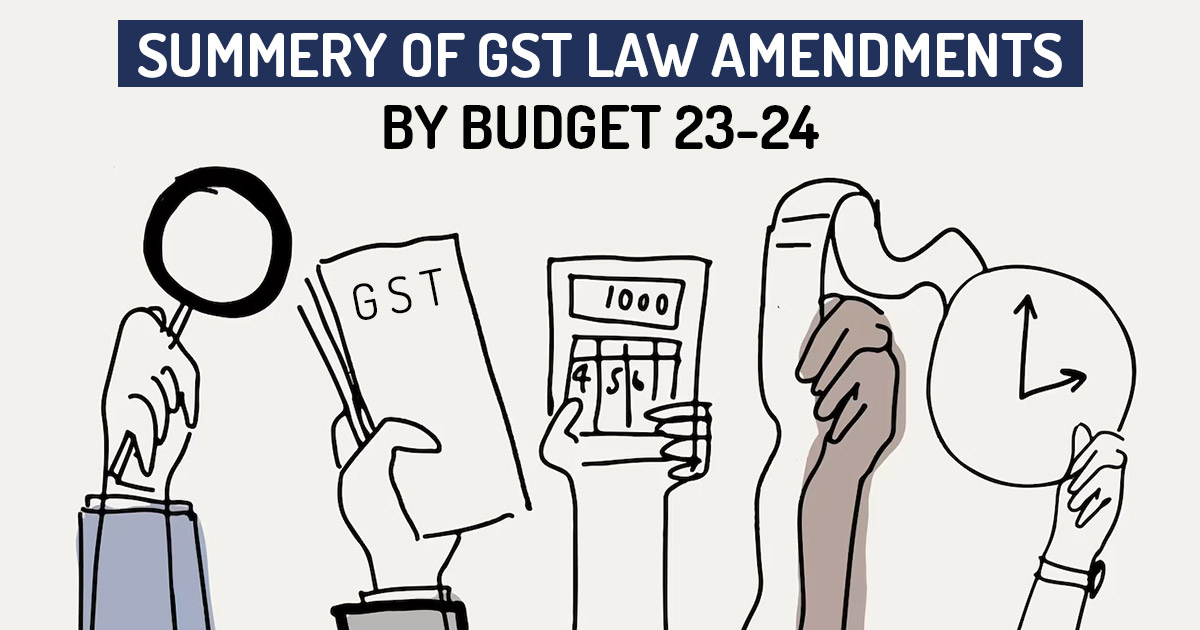
Finance Minister Nirmala Sitharaman proposed nine legislative revisions to the GST law in the Union Budget 2023.
Decriminalization GST Offences
- From the current range of 50% to 150% of the tax amount, the compounding amount is lowered to a range of 25% to 100%. This was done in order to increase the minimum tax threshold for starting a GST prosecution from Rs 1 crore to Rs 2 crore. With the exception of the crime of issuing bills without providing goods or services, or both.
- Decriminalized offences include obstructing or impeding any officer from carrying out his responsibilities, purposeful tampering with tangible evidence, and failing to provide information.
Facilitate Microbusiness E-commerce Operators
Unregistered suppliers and composition taxpayers will now be able to provide goods within a state via E-commerce operators (ECOs), subject to a few restrictions.
Changes to Schedule III of the 2017 CGST Act
Neither a supply of goods nor a supply of services should be viewed as a result of any activities or transactions.
With effect from February 1, 2019, changes were made to Schedule III of the CGST Act, 2017 to keep certain transactions and activities outside the scope of the GST. Examples include the supply of goods from one location outside the taxable territory to another location outside the taxable territory, sales over the high seas, and the supply of warehoused goods prior to their home clearance.
The provisions are being included to make the stated adjustments effective as of July 1, 2017, in order to eliminate any uncertainty or doubt regarding the taxability of such transactions or activities throughout the period of July 1, 2017, to January 31, 2019, and to achieve this
However, if any tax has already been paid in relation to such transactions or activities within the period of July 1, 2017, to January 31, 2019, no refund of tax paid shall be allowed.
GST Return Filing and Statement
The filing of GST returns and statements will now be limited to three years from the due date of the pertinent return or statement.
GST ITC for CSR-Related Expenditure
The input tax credit shall not be receivable in respect of goods or services or both obtained by a taxable person that is used or intended to be utilized for activities relevant to their duties under corporate social responsibility, according to a provision being added to the CGST Act.
Data Sharing
A new section of the CGST Act is being added to allow the registered person to share information with other systems in a manner that will be prescribed, whether it be information provided in a return, registration application, statement of outward supplies, or details uploaded for the creation of an electronic invoice, E-way bill, or any other details on the common portal.
GST Amendments in Section 2 Clause (16) of IGST Act, 2017
To update the definition of “non-taxable online recipient,” clause (16) of section 2 of the IGST Act has been revised. This will be accomplished by eliminating the requirement that online information and database access and retrieval services be used for purposes other than those of commerce, industry, or any other business or profession in order to ensure that OIDAR services provided by any person located in non-taxable territory to an unregistered person receiving the aforementioned services and residing in a taxable territory are subject to taxation.
It also aims to make it clear that individuals registered only for purposes of clause (vi) of Section 24 of the CGST Act would be regarded as unregistered individuals for the purposes of the aforementioned clause.
Retrieval Services or Information and Database Access Online
The definition of “online information and database access or retrieval services” in the IGST Act is being revised to remove the need for the provision of the stated supply to be mostly automated and involve minimal human participation.
Place of Supply
In accordance with the IGST Act, the proviso to subsection (8) of section 12 of the IGST act is eliminated in circumstances where the recipient and the service provider are different, in order to designate the location of supply, regardless of the destination of the goods.








